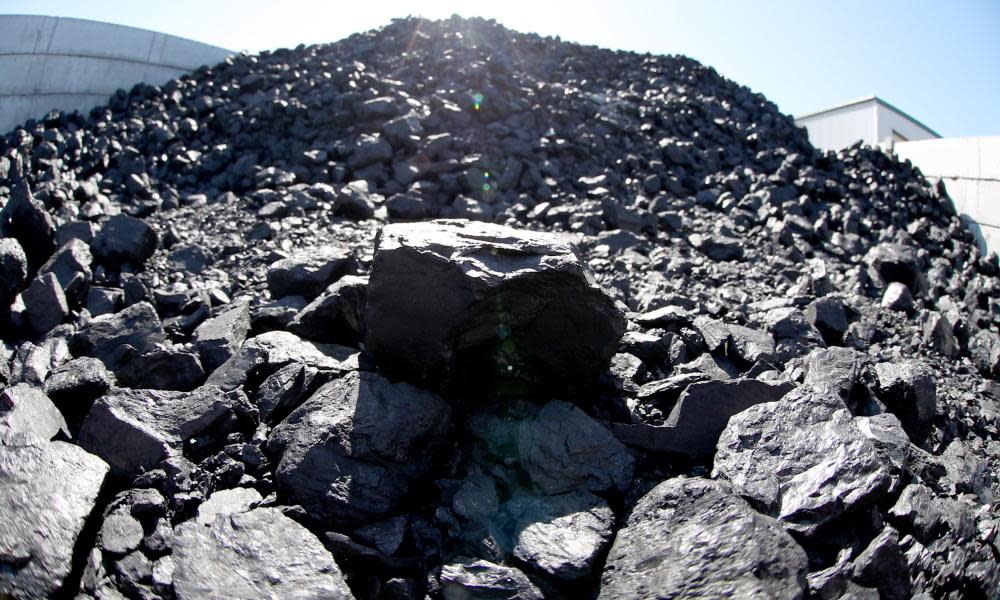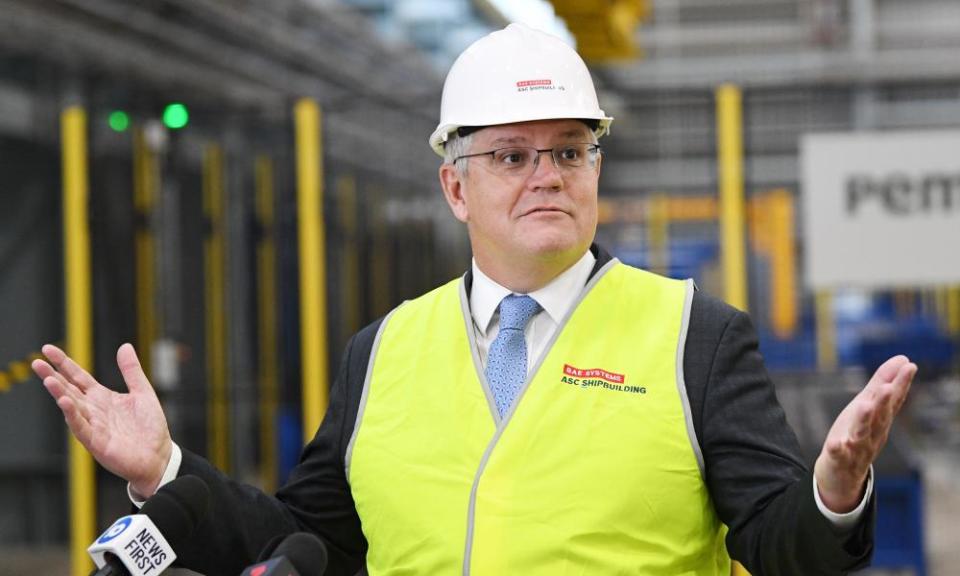Net zero: what if Australia misses the moment on climate action?

For a national leader who had just been told up to $80bn in fossil fuel export industries were on the chopping block, Scott Morrison seemed remarkably sanguine.
“I am not concerned about our future exports,” the prime minister said at a press conference on Wednesday. “I’m very aware of the many views that are held around the world but I tell you what – our policies will be set here in Australia.”
Morrison’s dismissive response was to a question about what observers say is the biggest shift in international climate politics since the signing of the Paris agreement five years ago. In the space of five weeks, three of Australia’s biggest trading partners – first China and then over the past week Japan and South Korea – promised to go “carbon-neutral” by 2050 or shortly after.
Related: Japan's net zero by 2050 pledge another warning to Australia on fossil fuels, analysts say
Long-time observers of climate change diplomacy said the scale of what is happening should not be underestimated.
“It’s really significant. It shows there is potential for hope – that we can really achieve what the Paris agreement is aiming for and limit warming to 1.5C,” says Ursula Fuentes, a former head of the German government unit responsible for climate policy and strategy.
“It’s hard to achieve, but it shows if we have leadership in some countries how fast others can come on board. It also shows Australia needs to start talking about an economic transformation, and introducing policies that will support that transformation, or it will be left behind.”
‘The tide is turning’
While the three countries are yet to spell out in detail how they will reach their targets, the economic ramifications for Australia are vast. Together, the trio buys 75% of Australia’s shipped thermal coal used in power generation, 50% of the coking coal used in steel production, and 87% of its liquefied natural gas (LNG).
Analysts say it raises at least two significant questions for the Morrison government. Will it become a pariah on climate change, increasingly diplomatically isolated and seen as unwilling to pull its weight?
Perhaps even more importantly, will it plan for an inevitable economic transition before fossil fuel industries, and the national economy, are mugged by reality?
The Morrison government’s position until now has been that climate change is a serious global problem that needs a global solution and that – despite significant evidence to the contrary – Australia was playing its part. But rather than applaud it, its response to the news that some of the world’s biggest emitters were promising to do more was to assert its sovereignty: it would not bow to pressure to live up to the commitments it made in Paris.
Related: Is a just transition from coal to renewables possible?
The pushback was both public and private. In a call on Tuesday night, Morrison turned down his British counterpart, Boris Johnson, when asked to sign up to a 2050 net zero commitment.
The Intergovernmental Panel on Climate Change found in 2018, in a report commissioned as part of the Paris agreement, that reaching net zero emissions by about this date was a necessary part of responding to the climate emergency. But Morrison told Johnson Australia would not agree to that goal for itself.
Sources familiar with the call said he instead asked the British leader to back Australia’s approach of setting goals to lower the cost for clean technology, which is tied to neither a timeframe or an emissions reduction plan. Johnson said he would consider it, but the press release his office issued after the meeting emphasised the importance of setting ambitious emissions targets and reaching net zero.
In the Senate estimates hearings that have dominated parliament over the past fortnight, the foreign minister, Marise Payne, repeatedly declined to say Australia welcomed Japan and South Korea signing up to net zero despite ostensibly wanting the world to reach that goal. Like many of the government’s claims on climate, the inconsistency went unexplained.

The gap between Australia and its major trading partners was emphasised in a report by a centre-right thinktank, the Blueprint Institute, linked to former Liberal ministers Robert Hill and Christopher Pyne, which warned not committing to net zero emissions by 2050 would hurt the country’s international standing and economic competitiveness. It said if ambition on climate was not increased soon “the decision may be forced upon us”.
“For a time, we’ve been able to trail behind our peers with little consequence for us or global temperatures,” the report said. “But the tide is turning.”
Britain has been urging countries to ramp up commitments since it was announced it would host the next major climate conference in Glasgow, now delayed until late next year. It has been pushing countries on two issues – a mid-century net zero target and to stop financing coal plants in the developing world.
Along with the UN, France, Chile and Italy, it will host an online climate summit in December to mark the fifth anniversary celebration of the Paris deal and push for greater action. Only countries that come armed with increased commitments will be invited to speak. That is expected to include China, which officials hope will use it to flesh out the ambitious short-term goals scientists advise are needed, but not Australia.
Economic opportunity beckons
The announcement by the Chinese president, Xi Jinping, at the UN general assembly in September that the country’s carbon dioxide emissions would peak before 2030 and it would reach carbon neutrality before 2060 took many by surprise.
China is by far the world’s biggest annual emitter – responsible for about half global coal use – and turning around its economy will be a massive task. But it has been working up to this moment, having modelled what a plan to limit warming to 1.5C would like last year. Observers believe it is a serious show of intent from Xi, motivated in part by a desire to move ahead of a possible Joe Biden US presidency, rather than risk pressure from a joint US-Europe push on climate in 2021.
Just as important a driver, though, is the economic opportunity presented by the inevitable low-emissions transition. Ben Caldecott, the director of the Oxford Sustainable Finance Programme and a leading voice in the British push for greater global action, says it is “completely in China’s interest to go down this path”.
He points out that the International Energy Agency, often criticised for its conservatism in forecasting the development of renewable energy, recently described solar power as the cheapest form of energy in human history. China is expected to include a climate focus, possibly including targets to cap coal use and lifting renewables, in its five-year economic plan due before the end of the year.
“These countries are all vying to shape their own and the world’s economic future,” Caldecott says. “The technology is becoming cheaper and cheaper and cheaper, and change is happening and not going to stop. The question is just: ‘what’s the plan?’”

The announcement by Japan, the world’s fifth biggest emitter, was just as surprising, and heavily influenced by the Chinese commitment. The new prime minister, Yoshihide Suga, used his first parliamentary policy speech since taking office to declare the climate crisis was no longer a constraint on economic growth, but an opportunity to be seized.
Japan is heavily reliant on energy imports – it is Australia’s biggest market for both thermal coal and LNG – and under Suga’s predecessor, Shinzo Abe, was seen as a recalcitrant player on climate. It continued to support new coal power as other developed countries stopped.
But the country is also investing heavily in large offshore wind farms and trialling the use of green ammonia, created with renewable energy, as a replacement fuel in a coal plant.
Llewelyn Hughes, an associate dean at the Australian National University’s College of Asia and the Pacific and an expert on Japan, says the 2050 goal is significant as it sets the direction for government agencies and businesses as they consider future policies and viable investments. Already, a number of planned coal plants in Japan have been cancelled, and it will become much harder for others to win finance. It is expected a new three-yearly energy plan, to be released in the middle of next year, will back a greater share of renewables compared with coal and gas.
Related: ‘Green hydrogen’ from renewables could become cheapest ‘transformative fuel’ within a decade
Both Japan and South Korea, which this week confirmed it would take steps to end its coal dependence and back a multibillion-dollar green new deal, are eyeing a future that includes green hydrogen – an industry the Morrison government hopes to develop, though it is also potentially backing hydrogen made with fossil fuels, a step some countries are bypassing.
The rush of major Asian powers to sign up to net zero follows similar commitments from other countries and particularly the EU, which is weighing a target of up to a 60% cut by 2030 compared with 1990 levels, and will consider a proposal on carbon border tariffs – which would add a cost at the border to carbon-intensive goods – next year.
The sense of momentum will kick into overdrive if Biden, who has promised to sign up to net zero, invest $2tn in clean solutions over four years and take an active role in global climate leadership, defeats Donald Trump in the US presidential election. One diplomatic source, speaking on condition of anonymity, said Australia would “be supremely isolated” on climate and come under significant pressure to change its stance if Biden wins.
Hare agrees, saying if Australia continues on its current path it risks being left sitting with nations that openly refuse to act, such as Brazil and Saudi Arabia. But he says the country should be particularly concerned about the economic fallout.
“The reality is the transition away from coal and then gas is going to happen much faster than Scott Morrison or the Labor party thinks, and it’s going to be extremely disruptive,” he says. “The workforce will be stranded. That’s why what is going on in Australia is so irresponsible.”


